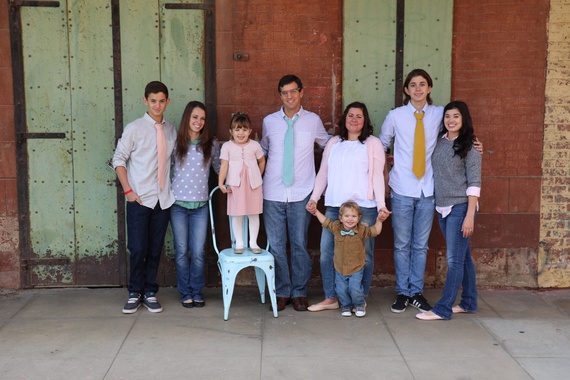Divorce is generally unpleasant. Oh sure, we all have that friend who sails through it with a smile on their face and a spring in their step, never exhibiting an outward moment of hesitation as they move through the divorce with an almost unicorn-like dignity and grace. Then there are the other 99.999 percent of us. I have been in the ugly tear-stained trenches of it all as my little one was ripped from my arms screaming for his Mommy. I have made some stupid mistakes, more than once. Sometimes I wonder if all the difficulties I have been through are the reason I am effective in this line of work. I promise I will not ask you to do something I haven't done before, and I really understand how you feel when you sit down in my office overwhelmed and in pain. Real, excruciating, pain that feels as if you have been punched in the gut. Not sleeping. Not eating. Feeling as if you are in a daze and as if all this is happening "to you" without any input, without any control. Your spouse may get your house, your children and steal your financial security, but the process may be more difficult than necessary. I am aware that I am not always easy on my clients. It is my job to tell you what you sometimes do not want to hear. There is no reason to pay someone thousands of dollars to just agree it's not your fault, unless, of course, that someone is your therapist. There are many different ways to get through this time, some more effective and healthy than others. After 21 years of practicing law, I would like to say I have seen it all, but just about every week we see new forms of additional self-imposed misery. So here are a few tips and what to avoid doing to make this divorce process a little shorter, less traumatic and maybe a little less expensive too.
1. You want what she/he is having.
In divorce, as in life, if you spend the days lamenting over what is going on with your ex, or anyone else for that matter, this will not lead you to your happy place. There will always be someone richer, younger, thinner, smarter, more accomplished along the way. No good comes from worrying about the things others have, material or otherwise. Your ex has a new significant other, a new house, a new car. Your ex is traveling the world (and they never did this with you). Your ex is spending your child support payment on their nails or golf. They are now father or mother of the year, and they never even changed a diaper! You cannot control someone or their actions, but you can control your reactions.
You can choose instead to be happy they stepped up to the plate with the children like they never did before, or that they have a nice house or car for your children to enjoy. You can just be happy they are not your problem anymore. These worries are serious "time wasters" that take the focus away from our own lives and happiness. They also make really crappy conversation starters with a new friend or love interest. Bitter and jealous are simply not fun to be around. As a big believer in Karma, wish them well and then move on to more important issues like your own happiness. Make sure your own glass is half-full or even better overflowing with new love, new friends and a happy home, even if it is a town home.
2. You believe you are not accountable for the failure of your marriage.
You were the kindest, most loving, nurturing spouse that ever was there -- I believe you, I really do. Are you at fault? Yes, you married someone who did not believe in your fabulousness. Most of the time, if we are really honest with ourselves, (not always easy or pretty, I know) we might admit, albeit reluctantly, we knew the very thing about our soon to be ex that now leads us running to the divorce lawyer. Of course, there are exceptions to this observation but so very often the signs are right there, the pink elephant we
chose to ignore. They were mean to other people, you had wildly different views of the world and life goals, they were financially irresponsible while you saved every penny, and the list goes on. You thought you could "fix them" or perhaps maybe just give up an essential piece of your soul and what matters, to make them happy. Then one day we wake up and realize the marriage is over, or perhaps they decided enough is enough, but we all play a part. When there is no singular fault and when we all accept our piece of where and how it all ends, we move on faster, we fight less, we spend less on lawyers and most importantly, we are less likely to make the same mistake again.
3. You can't forgive.
Well of course you can, but you just don't want to. I am NOT going to tell you that you have to forgive -- you don't. It is certainly your prerogative to hold on to that anger and hatred with all the passion and love once directed at your former beloved. You want to hold on to it tightly because it was a really awful horrible thing that was done to you. It is, after all, the reason you are in this mess in the first place, right? Someone else did this
to you (see number two above). There are some things that are unforgivable after all, are there not? Someone slept with your best friend, beat you, left you or lied to you. So don't forgive, but be prepared to pull out your checkbook for your lawyer and the therapist for you and maybe your kids too.
Anger and hatred have a direct correlation to a longer, messier divorce and higher attorneys fees while we punish the wrongdoer. Maybe you can change the dynamic with a little change in perspective. People who hurt us are often broken themselves with complicated stories and reasons that may have little to do with us. Maybe we should feel sorry for them instead of angry? Maybe we should realize how sad it is they will never know how they were loved, or be capable of giving love the way it was intended. The truth is forgiveness is not a favor to others; it is a favor to you. It frees up a space inside you for significantly better things. Think about the words "angry" and "bitter" and think of an image. Do they make you happy, do they look light and beautiful? Sometimes I wonder about the moments of our life. Would our moments be different if a clock was running down the moments left in this life on our new Apple watch? Would we choose to waste them rehashing the harms done to us, or choose moving forward towards more moments of joy? There is huge power in not allowing someone to steal more minutes of your life with anger or regret. So go ahead and stay mad or take back your power,
forgive and lower those attorney's fees, after all.
4. You believe you are entitled to the same life.
I often work against expectations so huge that Cinderella's fairy Godmother could not deliver them (and don't get me started on her; that girl has lead more people down the path to divorce, but I digress...). If you come to me or any lawyer believing you can have the same life you had before you divorced, you will be sadly disappointed and will spend unnecessary time and unnecessary fees. The math of divorce is simple division. Divide by two, your income and assets, and multiply by two, the amount of bills. Sounds great, right? I don't care if your lawyer wrote the book on divorce, the story always has the same ending, everyone will have less. Even in the biggest cases it applies. I call it "park the plane," everyone will tighten their belt or maybe just give up a house or two, but nobody gets to have it all. You simply can't believe, you might have to give up your custom decorated 10,000-square-foot apartment in Tribeca, and will pay any amount of money to avoid this travesty of justice. Your righteous indignation is blood in the water and the sharks are circling. Have a low-calorie alcoholic beverage and save those attorney's fees to put a down payment on a nice new penthouse on 5th Avenue.
Feelings of entitlement are costly and set us up to be disappointed in this life. You are both entitled to a life at the end of this mess but it will be a different life for you both. Maybe I am a cynic, (after all these years, who could blame me?) but there is no way to ensure your happiness other than to make sure no one else is responsible for it. Work hard, own your own destiny and be grateful for what you have, even if it is 50 percent less that you used to have; it is so much more than many others.
5. You surround yourself with "yes" men.
They might be your best friend from summer camp who you have known since you were 10, your parents, your sister, your brother, and all too often, your lawyer. Your "yes men" are the ones that support whatever you do no matter what. They nod in agreement whenever you call your ex a complete jerk, they agree you deserve to "get it all" for what the other party has done to you. They encourage you to fight for things you are not entitled to, they encourage you to use your children, hide your assets, fight for unreasonable positions and generally condone your bad behavior. They never see the other side, never hold you accountable for your actions, sometimes just because they love you unconditionally. Some of my dearest friends and family however, have been those who have held me accountable for my own piece of some fairly tragic "life detours" (people seem to really dislike the term mistake). Sometimes we need the people around us to tell us to get our shit together, to toughen up or lighten up. We say "no" to our children everyday because they need to know there are limits and expectations. No is not a bad thing. Be aware of those who agree with everything we do or say. Listen to those who show the real mirror to the not-so-pretty behavior. We all need to be reminded that this is not the end of the world, that no one is guaranteed a particular life unless we create it for ourselves and that who we are at the end of this crazy ride is what really matters.
6. You think too much about you.
There is nothing that makes people feel worse about themselves than being singularly focused on what is wrong with their day, their life, their kids, their job, their appearance. Perspective is the greatest gift we can allow ourselves to move toward being happy. I can focus today on my broken faucet, ice maker jamming up, piled up laundry, my daughters four cavities (no, that is not a typo, and yes, I brush her teeth). This which will now require us to fly back from vacation for the procedure because her Reactive Airway Disease makes sedation too risky now with her recent Bronchitis. In the alternative, I can focus on a friend who just lost her young husband with two young daughters and think about her. Today her pain is bigger than any pain I can imagine, her strength and courage fills my heart with awe that life is hard and people are so very resilient. These people and stories are a gift to remind us this too shall pass and there is more life to be lived. Look outside your pain and your struggles. Your house is not big enough or nice enough? You have a home. You have family that loves you but are driving you crazy? There is someone alone tonight. So try to focus on doing something that is not about you at all. Stop for a whole day and try not to complain about anything. Say out loud "someone has it worse, I should be grateful." You will be better prepared for this little bump in the road we call divorce.
I know divorce sucks, it is not supposed to end like this no matter how it ends. Someday you will be through it, hopefully sooner rather than later. Don't torture yourself or your spouse unnecessarily, you will make the lawyers rich, the judges annoyed and your children cranky. This divorce is a gift, a new life, different but better than ever, if you let it be. Get there as fast as you can, that clock is ticking.
© Krista Barth 2015 -- This feed and its contents are the property of The Huffington Post, and use is subject to our terms. It may be used for personal consumption, but may not be distributed on a website.



